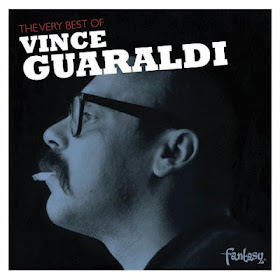Concord released The Very Best of Vince Guaraldi yesterday, a lovely collection of 14 tracks that includes some familiar faces ("Cast Your Fate to the Wind," "Christmas Time Is Here") with a few tracks ("Django," "The Lady's in Love with You") that haven't popped up on earlier career retrospectives. I was privileged to write the new liner notes, which gave me a chance to relate — once again — how Guaraldi hoped that "Treat Street" would become his follow-up hit to "Cast Your Fate to the Wind." Didn't happen, of course, but that's all right; quite a few of his songs didn't crack the charts during his lifetime, but have become very familiar these days. Sometimes it just takes the rest of the world awhile, to catch up to the artistic geniuses in our midst.
Anyway, I received a nice little note from Vinny Marino today, a fellow who obtained an advance review copy of the CD from Concord. He wanted to know if I were aware of the fact that Todd Rundgren, ah, "borrowed" portions of "Treat Street" for his instrumental, "Breathless," which appeared on the famed rocker's Something/Anything album. Picture my eyebrows shooting up; no, I replied, this was news to me. I immediately hied me hence to YouTube, where I knew it would be easy to find Rundgren's tune. Gave it a quick listen, and shurenuff, distinctive quotes from Guaraldi's "Treat Street" can be heard, starting at about 3:03. Give it a listen, and verify with thine own ears.
That's what I love about life; you learn something new every day.
Aside from Curiosity's successful landing in Mars' massive Gale Crater, last week also brought some pleasant news of a more personal sort: Jeff Dayton-Johnson's lengthy, thoughtful and quite complimentary review of my book, which debuted July 31 at the indispensable allaboutjazz web site. Jeff raises a few concerns, notably my fixation on backstory and occasional brain-stuffing wealth of sidebar details, and what he terms a "thinness of musical analysis." To the first charge, I plead guilty; having so many wonderful facts at my fingertips, I was loathe to abandon any of them (and, in fairness, Jeff cuts me some slack on that count, in the interest of scholarship). To the second charge, I sidestep and offer two excuses: In the first place, I wasn't sure my various roles, in this book, included that of critical lobotomist. In the second place, I've always been wary — given my background as an English major — of the "fatuous analysis" syndrome, wherein some stuffy teacher professes to understand precisely what this poet intended here, and that essayist intended there. When it comes to art — music, in this case — I'm inclined to believe that such observations are best left to the individual listener.
Ironically, some efforts at musical commentary were present in the first draft, but then were cut for space because I was some 75,000 words over what had been contracted. (I only trimmed some 25,000; McFarland let me keep the other 50,000.) For what it's worth, and because nothing ever goes to waste, some of that commentary wound up in my online Guaraldi discography.
But I absolutely accept Jeff's points; he defends them well, and obviously knows whereof he speaks, with respect to so many other aspects of jazz in general, and Guaraldi's career in particular. I'm very grateful for the review, and I'm equally sure that it'll be the most scholarly commentary I'm likely to receive.
Meanwhile, I'm working out the details of an upcoming appearance — 7 p.m. Thursday, September 13 — at the St. Helena Public Library, in Northern California, when I'll next preach The Gospel According to Vince. Always a happy occasion.

No comments:
Post a Comment
Your thoughts are observations are welcome! Please remember that you won't be notified when other visitors add comments, so check back periodically, to see if your comments have prompted a response.